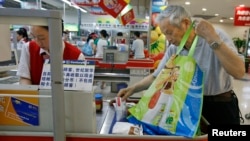China's crackdown on imports of plastic trash should be a signal for rich nations to increase recycling and cut down on non-essential products such as plastic drinking straws, the head of the U.N. Environment Program said on Monday.
Erik Solheim, a former Norwegian environment minister, urged developed nations to re-think their use of plastics and not simply seek alternative foreign dumping grounds after China's restrictions took effect this month.
"We should see the Chinese decision I heard some complaints from Europeans as a great service to the people of China and a wake-up call to the rest of the world," he said in a telephone interview from Nairobi. "And there are lots of products we simply don't need."
Prime examples, he said, were microbeads - tiny pieces of plastic often used in cosmetics which have been found to pollute the world's oceans, rivers and lakes - and drinking straws.
"The average American uses 600 straws a year," he said, generating vast amounts of plastic waste. "Everyone can drink straight from the bottle or the cup."
He suggested restaurants and bars could put up signs along the lines of: "If you desperately need a straw we will provide it."
Some companies have already cut back on straws.
He praised bans on microbeads, sometimes used as abrasives in facial scrubs or toothpaste. The United States passed a law in 2015 to ban microbeads and a ban in Britain took effect this month.
Piles of waste have built up in some western ports after China, the main destination for more than half of plastic waste exported by western nations, banned "foreign garbage" including some grades of plastics and paper.
Solheim said companies including Coca-Cola, Nestle and Danone were taking steps to raise plastic recycling or to shift to biodegradable packaging. Kenya has banned plastic bags.
"But the problem is so huge that a lot more needs to be done" by governments and businesses, Solheim said.
"It's a much better idea if nations overall take care of their own waste," rather than seek new dumping grounds, he said, adding that: "It's not obvious that well-run nations like India and Vietnam want to be taking over this waste," after China's ban.
Last week, the European Commission outlined a new policy push to promote recycling of plastic. It said it was mulling a tax, curbs on throwaway items such as plastic bags and new quality standards.
In December, almost 200 nations signed a U.N. resolution to eliminate plastic pollution in the oceans, with the U.N. Environment Agency projecting that there could be more plastic in the sea than fish by 2050.





